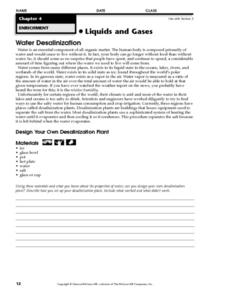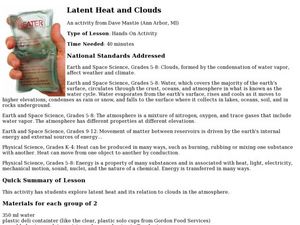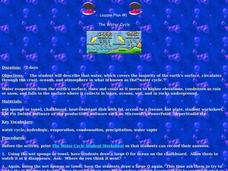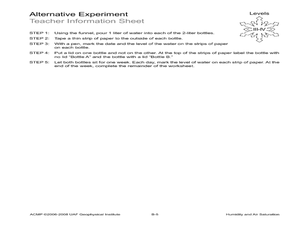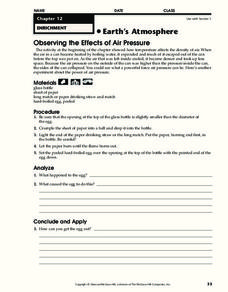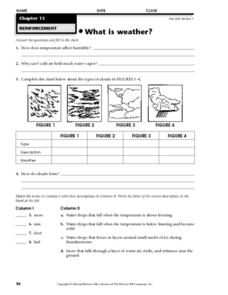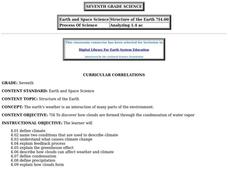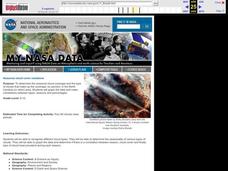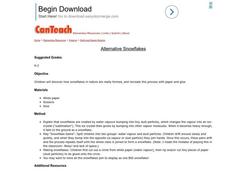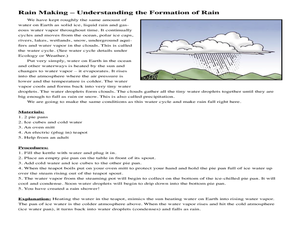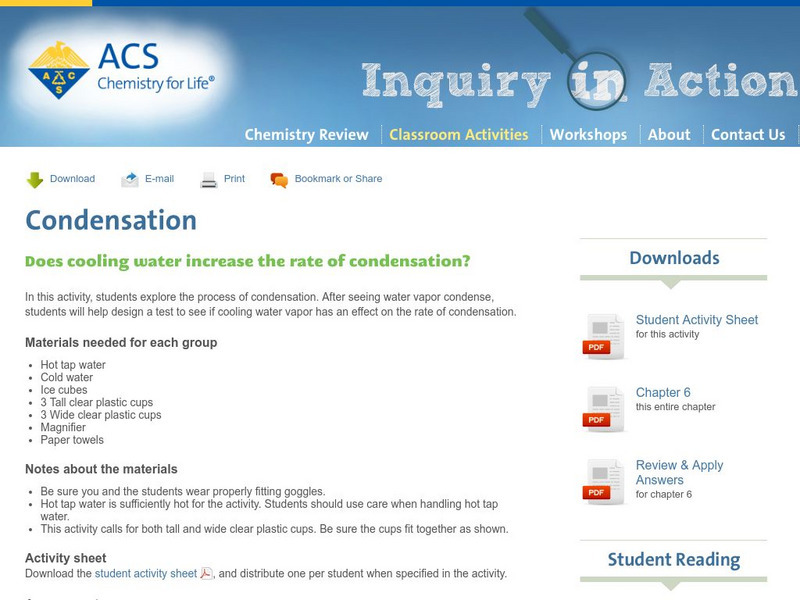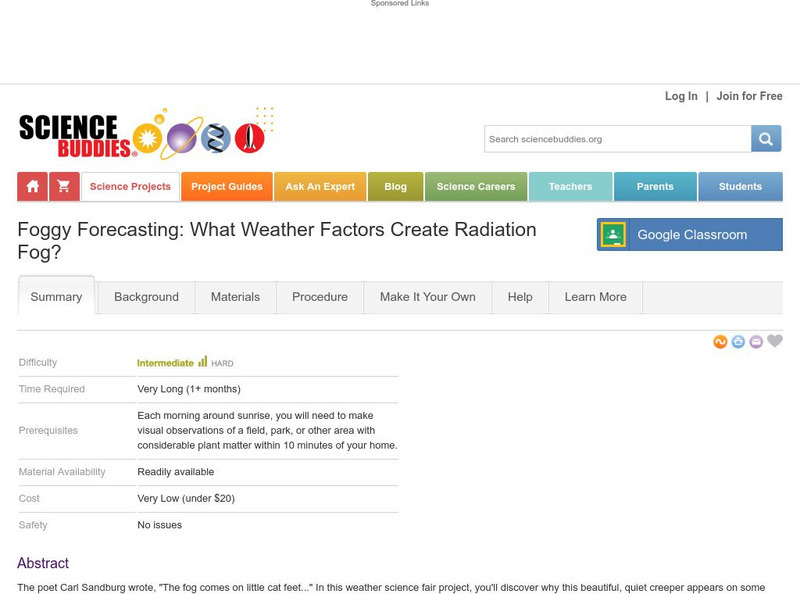Curated OER
Water Desalinization
In this water desalinization worksheet, students will design and construct their own desalinization plant. Then they will describe how they set up their experiment and if it worked or not.
Curated OER
Condensation
Introduce middle school science learners to condensation with this presentation. It begins with a brief explanation of the process and humidity, but does not present all of the details. Three demonstrations need to be set up ahead of...
Curated OER
Latent Heat and Clouds
Learners explore latent heat and how it relates to clouds in the atmosphere. In this earth science lesson students investigate how clouds are formed. Learners examine clouds and the water cycle.
Curated OER
The Water Cycle
Students explore the water cycle. In this water cycle lesson, students experiment with a variety of activities to discover what happens during the water cycle. Students create their own animated versions of the water cycle using...
Curated OER
Humidity and Air Saturation
Young scholars experiment with air saturation. In this earth science lesson, students first complete an activity which teaches humidity. Then they use the scientific method to create their own experiments to test how long it takes a...
Curated OER
Let's Make a Cloud
Students watch the teacher make a cloud. In this water cycle lesson plan, students discuss the water cycle and see the formation of a cloud. The teacher leads the discussion including the role of water vapor, smoke and air pressure.
Curated OER
From Liquid to Gas
Young scholars observe an experiment. In this water lesson plan, students observe as water is changed into vapor. They record their observations by completing a data sheet.
Curated OER
The Perfect Storm
In this weather worksheet, students read about the mechanics of a hurricane and then complete 4 short answer questions based on the reading.
Curated OER
Earth's Atmosphere
For this Earth's atmosphere worksheet, students observe the effects of air pressure using an egg. They describe what happens to the egg and what makes it do what it does. Then they determine how to get the egg out of the bottle opening...
Curated OER
What is Weather II?
In this weather worksheet, students explain how temperature affects the humidity in weather. Then they complete a chart about the different types of clouds seen in the sky. Students also describe how clouds form and why.
Curated OER
Structure of the Earth
Seventh graders study the cause of climate change, and how clouds form and affect weather. They define condensation and precipitation, the greenhouse effect and the water cycle.
Curated OER
Measuring Water Vapor: The Microwave Water Radiometer (MWR)
Students investigate water vapor. They view and analyze photos, conduct Internet research, and analyze the total water vapor/total liquid water data plot.
Curated OER
Seasonal Cloud Cover Variations
High schoolers recognize different cloud types. They determine the seaonality of various types of clouds. They graph the data and determine if a correlation exists between season, cloud cover and type of clouds most prevalent during each...
Curated OER
Alternative Snowflakes
Students discover how snowflakes in nature are really formed, and recreate this process with paper and glue. This art instructional activity gets some scientific learning in as well.
Curated OER
Rain Making - Understanding the Formation of Rain
Students read and conduct and experiment to learn about rain formation. In this water forms lesson, students read about the formation of rain and its purposes. Students then complete a rain experiment activity.
Curated OER
Chemistry: The Collapsing Can
Students observe methods by which air can crush aluminum cans. As water in the can boils and is sealed, the can collapses as it cools. When the procedure is reversed, the can expands to its original shape. After the alternate experiment,...
Curated OER
Observing, Describing, And Identifying Contrails
Students compare the three types of contrails that are produced by aircraft exhaust. They examine pictures of contrails on the internet to classify each as short lived, persistent or persistent spreading. They then sketch examples in...
Curated OER
Learning Lesson: Sweatin' to the Coldies
Students participate in a demonstration to show the change of water vapor to a liquid. They discuss the three states of matter. They examine flash flood safety to end the lesson plan.
American Chemical Society
Inquiry in Action: Condensation
In this activity, students explore the process of condensation. After seeing water vapor condense, students will help design a test to see if cooling water vapor has an effect on the rate of condensation.
American Chemical Society
Inquiry in Action: Exploring Moisture on the Outside of Cold Cup
In this activity, students investigate how condensation causes moisture to form on the outside of a cold cup. To see if the condensed water vapor comes from the air, students use 2 cold cups, but limit the air around one of them by...
American Chemical Society
Inquiry in Action: Explore Moisture on Outside of a Cold Cup (Dry Environment)
Regardless of the time of year or region of the country students live in, they have likely experienced moisture on the outside of a cold drink or another cold surface. In this activity, students will prepare a sample of humid air since...
University of Iowa
University of Iowa: Small Comets
This site provides extensive information on the controversial theory that there are millions of small comets which continually burn up yearly in the earth's atmosphere.
Science Buddies
Science Buddies: Foggy Forecasting: What Weather Factors Create Radiation Fog?
The poet Carl Sandburg wrote, "The fog comes on little cat feet". In this weather science fair project, you'll discover why this beautiful, quiet creeper appears on some days, and not on others. If you are fascinated by fog and weather...
Vision Learning
Visionlearning: Atmosphere and Oceans: Composition of Earth's Atmosphere
An explanation of the different parts of the atmosphere and how pressure and temperature changes at different altitudes.


